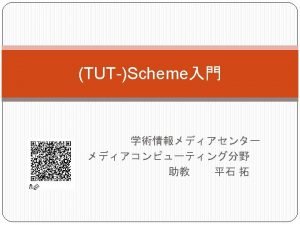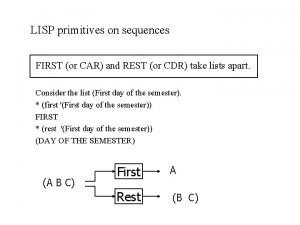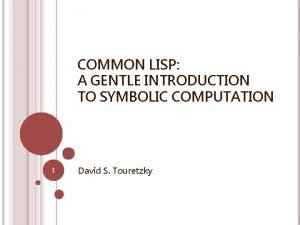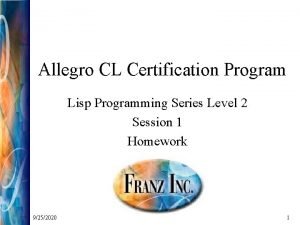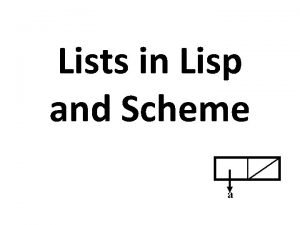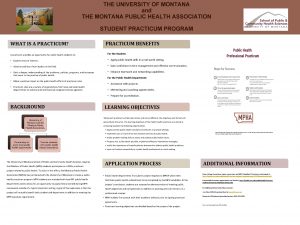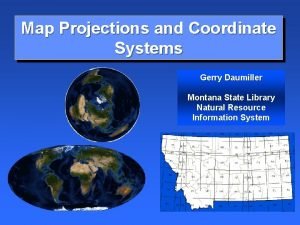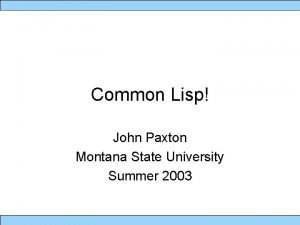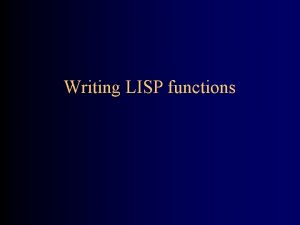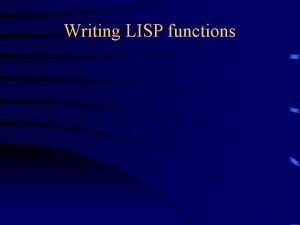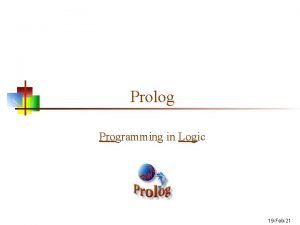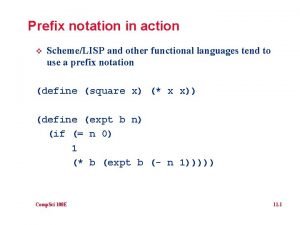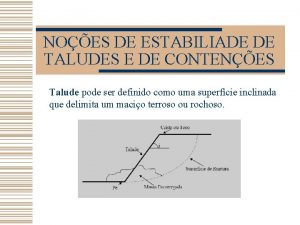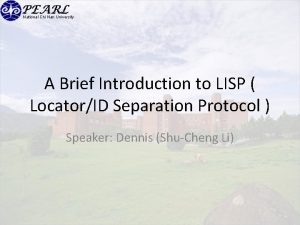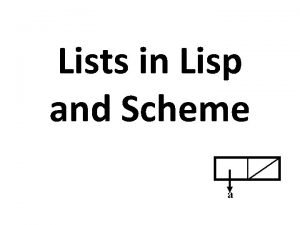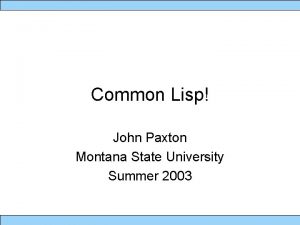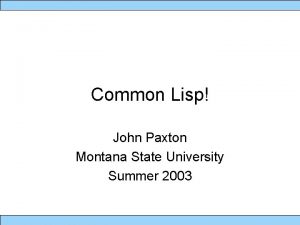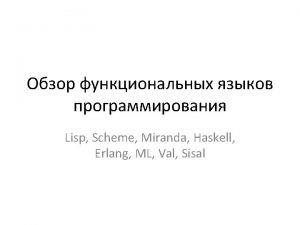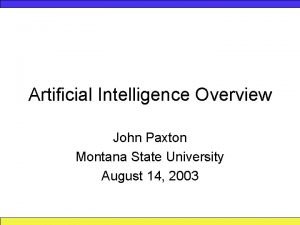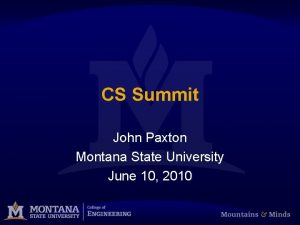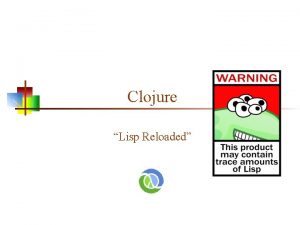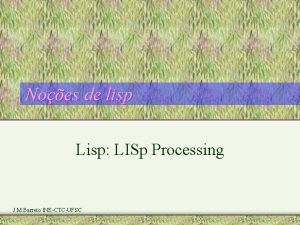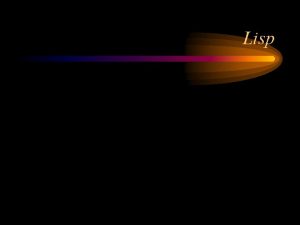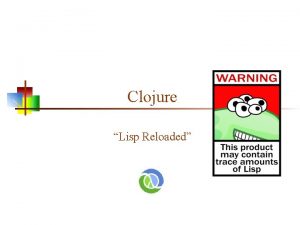Common Lisp John Paxton Montana State University Summer


























- Slides: 26

Common Lisp! John Paxton Montana State University Summer 2003

Textbook Lisp, 3 rd Edition Winston, Horn Addison-Wesley 1989

Where is Montana?

Where is Bozeman?

Why Lisp? • • Interpreted environment Editing and debugging tools Built on many years of experience Code and data have same form • Lisp = List Processing

Lisp Myths • • • It’s slow Programs are large Requires expensive computers Hard to read Hard to learn

Terminology • atom, e. g. 1 • list, e. g. ‘(1 2 3) • s-expression

Comment ; ; Line comments start with two semicolons.

first > (first '(1 2 3)) 1 • second, third, fourth, fifth, sixth, seventh, eighth, ninth, tenth

rest > (rest '(1 2 3)) (2 3) > (rest 'apple) *** - REST: APPLE is not a list

setf > (setf location 'san-salvador) SAN-SALVADOR > location SAN-SALVADOR

cons > (cons 1 '(2 3)) (1 2 3) > (cons '(1) '(2 3)) ((1) 2 3)

append > (append '(1) '(2 3)) (1 2 3) > (append 1 '(2 3)) *** - APPEND: 1 is not a list (append '(1) 2) (1. 2)

list > (list 1) (1) > (list 1 2 3 4) (1 2 3 4)

length > (length 'apple) *** - LENGTH: APPLE is not a sequence > (length '(1 2 3 4)) 4

reverse > (reverse '(1 2 3)) (3 2 1) > (reverse '((1 2) 3)) (3 (1 2))

assoc > (assoc 'mister '((miss senorita) (mister senor))) (MISTER SENOR)

nthcdr (nthcdr 0 '(1 2 3)) (1 2 3) > (nthcdr 1 '(1 2 3)) (2 3) > (nthcdr 4 '(1 2 3)) NIL

butlast > (butlast '(1 2 3) 0) (1 2 3) > (butlast '(1 2 3) 1) (1 2) > (butlast '(1 2 3) 4) NIL

last > (last '(1 2 3)) (3)

Mathematical Operators • • + * / > (+ 2 (* 3 4)) 14

Mathematical Functions • • round float max min expt sqrt abs

Questions 1. 2. 3. 4. 5. 6. How do you invoke CLISP? How do you exit CLISP? What happens when you enter 5? What happens when you enter ‘vertigo? What happens when you enter ‘(vertigo notorious).

Questions 7. What happens when you enter (vertigo notorious) ? 8. Give the variable movies the value ‘(vertigo notorious). 9. Access the first element of movies. 10. Access all of the elements of movies except for the first element. 11. What is t? What is nil?

Questions 12. Add spellbound to the front of movies. 13. Add spellbound to the end of movies. 14. Use list, append, and cons to build the list ‘(plantain guava). 15. Determine how many items are in movies. 16. Change movies so that the movies are listed in reverse order.

Questions 17. Calculate the sum of 2 plus 3. 18. Calculate the sum of 2 plus 3 plus 4. 19. Write an expression that uses the quadratic formula to calculate one of the roots of x 2 + x – 6 = 0. 20. What happens when you make an error? 21. How do you recover from an error?
 Avery paxton
Avery paxton Taylor paxton
Taylor paxton Donna paxton
Donna paxton Montana state uit
Montana state uit Common lisp assoc
Common lisp assoc Auto lisp
Auto lisp Lisp car
Lisp car Common lisp: a gentle introduction to symbolic computation
Common lisp: a gentle introduction to symbolic computation Allegro write program
Allegro write program Positive list scheme
Positive list scheme University of montana cyberbear
University of montana cyberbear University of montana mph
University of montana mph Montana state fish
Montana state fish Distortion
Distortion Montanas state flag
Montanas state flag Amy jenks state of montana
Amy jenks state of montana Uit montana state
Uit montana state State of montana emacs
State of montana emacs Lisp cond
Lisp cond Cond in lisp
Cond in lisp Scheme implementation
Scheme implementation Lisp and prolog
Lisp and prolog Lisp polish notation
Lisp polish notation Lisp talude
Lisp talude Lisp cisco
Lisp cisco Scheme append to list
Scheme append to list Cons in lisp
Cons in lisp





